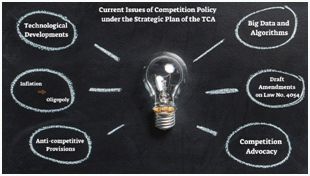After the first Strategic Plan of the Turkish Competition Authority (the "TCA") which has been implemented following its publication on February 26th, 2014, the TCA published its much-awaited second Strategic Plan1 (the "Strategic Plan") on March 13th, 2019. The primary objectives of the Strategic Plan are:
- to provide a solid ground for determination of midterm and long term strategic priorities of the TCA and other relevant administrative bodies on implementation of competition policy and competition law enforcement,
- to allocate resources in accordance with strategic priorities by way of establishing a fiscal discipline,
- to provide efficient and effective use of these sources and development of transparency and accountability of the TCA.
Following the explanations on the procedural aspects of the Strategic Plan, which indicates the scope and objectives of the Strategic Plan, and how it was prepared, the TCA initially provides its status quo analysis reflecting the current issues of competition policy in Turkey. To that end, the TCA generally examines the progress in the aftermath of the first strategic plan and to what extent the strategic objectives set forth under the former plan achieved. In this respect, the conclusions of the TCA on this front could be summarized as follows:
- Technological developments make powers and instruments of the TCA insufficient for the purposes of collecting evidence in order to prove competition law infringements.
- Taking into account the increasing role of big data and collusion by algorithms, the lack of technical capabilities of the TCA creates difficulties for determination of and intervention on anti-competitive behaviours of the undertakings by using algorithms, big data analytics etc.
 The upward trend of inflation in Turkish economy
increases the risk of cartels and hampers the ability to identify
the concerted practices in oligopolistic markets.
The upward trend of inflation in Turkish economy
increases the risk of cartels and hampers the ability to identify
the concerted practices in oligopolistic markets.- Constant delay in adoption of the draft amendments on Law No. 4054 on Protection of Competition ("Law No. 4054"), which introduce legal concepts such as 'de minimis' rule, 'settlement' and 'commitment' to the Turkish competition law regime, prevents the TCA from efficient competition law enforcement.
- The policies adopted by the TCA with respect to competition advocacy and enhancement of competitive environment are not accepted by other public institutions on the targeted level.
- In the absence of effective competition advocacy, certain primary and secondary legislations can unnecessarily lead to impediments on competitive landscape of certain market by its provisions ignoring the importance of effective competition.
In its Strategic Plan, the TCA repeatedly underlines the importance of requirement for revised policy understanding and instruments. In this respect, the TCA emphasizes that competition authorities should focus on the essence of competition in markets by taking into consideration changing business models with the effect of technological development. Particularly, according to the Strategic Plan, as rapid development of technology has globally affected almost all sectors, innovation has become the most significant parameter of competition. That being said, according to the Strategic Plan, together with the evolvement of innovation, several structural breakdowns and behavioural issues has arisen in markets. Therefore, the TCA concludes that during policy-making process, "competition for the market" principle and "sustainability of innovation" should be considered as baseline. Moreover, the TCA also emphasizes that as innovative developments resulted with artificial intelligence and algorithms provide undertakings with easier methods to collude and monitoring mechanisms against the undertakings aiming to abandon the anti-competitive collaboration, competition authorities need to renovate themselves in line with technological development adopted by the undertakings.
Accordingly, the TCA underlines the requirement for a road map in order to expand and/or concretize the scope the TCA's investigation powers to collect evidence during on-site inspections in terms of digital forensics and establishment of necessary capabilities (technical infrastructure) to effectively use these powers. Furthermore, the TCA states that, in long-term, detection of communication and monitoring by technical instruments would be useful for detection of cartels.
The Strategic Plan also sets forth that public policy is required to strengthen consumers by enabling them to have easy access to the information and assuring fast and effective dispute resolution mechanisms. The reasoning behind such conclusion is because end consumers are significantly inactive for the markets in which information asymmetry and transaction costs are high. In that case, according to the Strategic Plan, efficiency and competitiveness of most markets necessarily depend on active participation of end consumers on the demand side.
Further, as indicated within the Strategic Plan, the concepts of "internet of objects" and "big data" have gained importance for competition strategies of the undertakings active in the markets in which they are conducting activities close to the consumers such as retail. In this respect, the TCA refers to further competition law concerns on the potential negative impacts of undertakings' access to information of consumers on consumer welfare. Therefore, according to the Strategic Plan, who is the owner of consumers' information, to what extent the undertakings should be permitted to access to such information and whether a price could be set for such access etc. will also be subject of competition law policy.
Therefore, for the sectors like energy, food, e-commerce, healthcare, transportation and information technologies and communication, the TCA explicitly indicates that competition authorities should develop competition policies which could strengthen consumers and prevent undertakings from using the opportunity to access consumers' information in a way that could ultimately harm consumer welfare. To that end, the TCA suggests more pro-active competition policy enabling an effective competition advocacy duty instead of a policy prioritizing ex-post interventions.
As a general approach, the TCA states that in order to provide consumer welfare and allocative efficiency in an economic environment rapidly becoming more dynamic, "effect-based approach", which leaves with more room for a competition law analysis to argue whether the loss bearded by consumers could be compensated by economic benefits, should be adopted.
In addition, the TCA suggests in its Strategic Plan that
- determination and correction of structural and behavioural issues in commodity markets,
- emphasizing the efficiency-decreasing effects of price regulations or state interventions on markets and,
- revealing anti-competitive structuring in food supply chain
would emerge as the areas for which competition policy could bring new perspectives.
Footnote
1. Please see https://www.rekabet.gov.tr/Dosya/geneldosya/rk-stratejik-plani-pdf, last date of visit: 13.03.2019.
The content of this article is intended to provide a general guide to the subject matter. Specialist advice should be sought about your specific circumstances.


